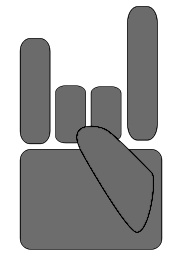 In news that has all the markings of a cloak-and-dagger tale, Chinese media are saying that Apple (Nasdaq: AAPL) COO Tim Cook came calling this week on China’s dominant mobile carrier, China Mobile (NYSE: CHL; HKEx: 941), in a report that featured a blurry photo of a potentially Western-looking man viewed from the back walking briskly through the lobby of a Chinese company. (Chinese article) China Mobile announced nearly a year ago that it was in talks with Apple to develop a model of its wildly popular iPhone that could run on the telco’s problematic 3G network, based on a homegrown technology standard known as TD-SCDMA. China Mobile has given few substative updates on that plan since the initial disclosure, but I suspect the arrival of such a high-level Apple executive, if true, means an official announcement could be near. The roll-out of such a model would mark a huge development for China Mobile, which has steadily lost market share in the 3G space to rivals Unicom (NYSE: CHU; HKEx: 762) and China Telecom (NYSE: CHA; HKEx: 728) not only due to technical issues, but also a lack of hot-selling handsets developed for TD-SCDMA. Unicom has used its status as China’s only telco with an official iPhone tie-up to turbocharge its 3G service, stealing steady share from China Mobile in this space particularly suited to smartphones that can take advantage of 3G’s high-speed data capabilities. Furthermore, iPhones enjoy just as much if not more popularity in China as they do elsewhere in the world, meaning China Mobile would be almost guaranteed to see a huge bump in its 3G subscriber growth if it can offer a 3G iPhone. I’m not usually one to get caught up in market hype, but China Mobile’s roll out of a 3G iPhone in the next few months, if it happens, would be a major game-changer in the country’s 3G market, helping China Mobile regain some of the momentum it has lost to Unicom and China Telecom.
In news that has all the markings of a cloak-and-dagger tale, Chinese media are saying that Apple (Nasdaq: AAPL) COO Tim Cook came calling this week on China’s dominant mobile carrier, China Mobile (NYSE: CHL; HKEx: 941), in a report that featured a blurry photo of a potentially Western-looking man viewed from the back walking briskly through the lobby of a Chinese company. (Chinese article) China Mobile announced nearly a year ago that it was in talks with Apple to develop a model of its wildly popular iPhone that could run on the telco’s problematic 3G network, based on a homegrown technology standard known as TD-SCDMA. China Mobile has given few substative updates on that plan since the initial disclosure, but I suspect the arrival of such a high-level Apple executive, if true, means an official announcement could be near. The roll-out of such a model would mark a huge development for China Mobile, which has steadily lost market share in the 3G space to rivals Unicom (NYSE: CHU; HKEx: 762) and China Telecom (NYSE: CHA; HKEx: 728) not only due to technical issues, but also a lack of hot-selling handsets developed for TD-SCDMA. Unicom has used its status as China’s only telco with an official iPhone tie-up to turbocharge its 3G service, stealing steady share from China Mobile in this space particularly suited to smartphones that can take advantage of 3G’s high-speed data capabilities. Furthermore, iPhones enjoy just as much if not more popularity in China as they do elsewhere in the world, meaning China Mobile would be almost guaranteed to see a huge bump in its 3G subscriber growth if it can offer a 3G iPhone. I’m not usually one to get caught up in market hype, but China Mobile’s roll out of a 3G iPhone in the next few months, if it happens, would be a major game-changer in the country’s 3G market, helping China Mobile regain some of the momentum it has lost to Unicom and China Telecom.
Bottom line: China Mobile’s potential roll-out of a TD-SCDMA 3G iPhone in the next few months could help it regain momentum it has lost to rivals China Unicom and China Telecom.
中国媒体报导称,苹果<AAPL.O>首席运营官蒂姆•库克(Tim Cook)本周现身中国移动<0941.HK><CHL.N>总部。有报导还配发了一张模糊的照片,照片中一名西方人模样的男子迅速穿过中国移动总部大厅。中国移动近一年前宣布,公司正与苹果就开发TD-SCDMA网络制式的3G版iPhone机型进行谈判,但中移动在此之後便鲜有後续消息披露。但我猜测,苹果高层的造访——如果确有其事——意味着一份正式的合作声明可能即将出台。类似机型的推出对中移动而言将是个巨大进展。中国移动在与中国联通<0762.HK><CHU.N>和中国电信<0728.HK><CHA.N>的3G竞争中不断丢失市场份额,其中不光有技术原因,也因为中移动缺少基於TD-SCDMA制式的热销机型。作为iPhone手机在中国唯一的授权运营商,中国联通在3G领域不断蚕食中国移动的市场份额。此外,iPhone在中国受欢迎程度并不亚于世界其它国家,意味着中国移动如果能提供3G版iPhone,其3G用户数量几乎肯定会大幅增长。我通常不是跟风炒作市场的人,但中国移动若在未来几个月推出3G版iPhone,势将改变国内3G市场格局,并有助於中国移动赢回中国联通和中国电信抢走的市场份额。
一句话:中国移动未来几个月可能推出TD-SCDMA网络制式的3G版iPhone,有助於其赢回中国联通和中国电信抢走的市场份额。
Related postings 相关文章:
◙ Unicom Builds Legitimacy with Sina Tie-Up 中国联通联手新浪
◙ China Mobile Finally Pushing on 3G 中国移动终於要大力推动3G业务
◙ Unicom, China Telecom Come Nipping at China Mobile’s 3G Heels 中国联通和中国电信紧盯中国移动3G市场

 Just three months after taking one of its first baby footsteps outside its protected home market, Baoshan Iron & Steel (Shanghai: 600019), China’s second biggest steelmaker, is looking to expand its Southeast Asia footprint by buying into Amsteel Mills, a unit of Malaysia’s Lion Group. (
Just three months after taking one of its first baby footsteps outside its protected home market, Baoshan Iron & Steel (Shanghai: 600019), China’s second biggest steelmaker, is looking to expand its Southeast Asia footprint by buying into Amsteel Mills, a unit of Malaysia’s Lion Group. ( Leading online video site Youku (NYSE: YOKU) thinks it may have discovered a new goldmine in China’s new fondness for luxury brands, boasting that a number of top global designers, including Louis Vuitton, Burberry and Gucci, have flocked to its channel in recent months. (
Leading online video site Youku (NYSE: YOKU) thinks it may have discovered a new goldmine in China’s new fondness for luxury brands, boasting that a number of top global designers, including Louis Vuitton, Burberry and Gucci, have flocked to its channel in recent months. ( been declining steadily since the middle of last year after inventory issues first started to emerge at this once promising company. I would look for anemic demand during the roadshow for its China IPO, and probably an even weaker debut for the company’s shares, which have been priced at the low end of their range at 18 yuan each. BYD is already fighting a difficult battle by launching its IPO into a decidedly bearish market. But Wang and his company need to change their tone a bit and start focusing on what they will do in the present to turn the company around, rather than on their big hopes for electric vehicles in the future, if they want to prevent this new listing from becoming a total disaster.
been declining steadily since the middle of last year after inventory issues first started to emerge at this once promising company. I would look for anemic demand during the roadshow for its China IPO, and probably an even weaker debut for the company’s shares, which have been priced at the low end of their range at 18 yuan each. BYD is already fighting a difficult battle by launching its IPO into a decidedly bearish market. But Wang and his company need to change their tone a bit and start focusing on what they will do in the present to turn the company around, rather than on their big hopes for electric vehicles in the future, if they want to prevent this new listing from becoming a total disaster. seen prices fall steadily in the last six months due to weak global demand as interest in this once promising sector dims with the fading of the global financial crisis. This kind of extended warranty is probably not a bad idea from a marketing perspective, and presumably won’t add much cost to Trina since most of its products are probably already solid enough that buyers wouldn’t need to ever actually exercise such warranties. So perhaps it could steal a sale or two from a rival, assuming others don’t follow suit with similar warranties. But at the end of the day, the only thing that will really help Trina, or any other solar panel makers for that matter, is a return in demand for installing new solar energy, which doesn’t look set to happen anytime soon. We saw an interesting move last week as a couple of solar panel makers announced plans to build their own solar plant to create more demand for their products (
seen prices fall steadily in the last six months due to weak global demand as interest in this once promising sector dims with the fading of the global financial crisis. This kind of extended warranty is probably not a bad idea from a marketing perspective, and presumably won’t add much cost to Trina since most of its products are probably already solid enough that buyers wouldn’t need to ever actually exercise such warranties. So perhaps it could steal a sale or two from a rival, assuming others don’t follow suit with similar warranties. But at the end of the day, the only thing that will really help Trina, or any other solar panel makers for that matter, is a return in demand for installing new solar energy, which doesn’t look set to happen anytime soon. We saw an interesting move last week as a couple of solar panel makers announced plans to build their own solar plant to create more demand for their products ( also sniffing the China bushes for potential investments in a bid to capture a piece of what’s likely to become the world’s largest SNS market in the next decade. Facebook has made no secret of its strong desire to enter China over the last five years. After getting locked out of the market a few years ago by Chinese Web blockers, the company approached Kaixin, one of China’s top two SNS sites, a couple of years ago about buying into the company but was ultimately rebuffed. More recently, it has reportedly started talking with search leader Baidu (Nasdaq: BIDU) about a tie-up even as Beijing has laid down difficult conditions aimed at keeping the US giant out of the market. (
also sniffing the China bushes for potential investments in a bid to capture a piece of what’s likely to become the world’s largest SNS market in the next decade. Facebook has made no secret of its strong desire to enter China over the last five years. After getting locked out of the market a few years ago by Chinese Web blockers, the company approached Kaixin, one of China’s top two SNS sites, a couple of years ago about buying into the company but was ultimately rebuffed. More recently, it has reportedly started talking with search leader Baidu (Nasdaq: BIDU) about a tie-up even as Beijing has laid down difficult conditions aimed at keeping the US giant out of the market. ( Just a week after announcing a major shake-up in its top ranks, Hewlett-Packard (NYSE: HPQ) has announced a new head for its China operations in a bid to breathe new life into a market where it has stumbled badly in the last year. (
Just a week after announcing a major shake-up in its top ranks, Hewlett-Packard (NYSE: HPQ) has announced a new head for its China operations in a bid to breathe new life into a market where it has stumbled badly in the last year. (